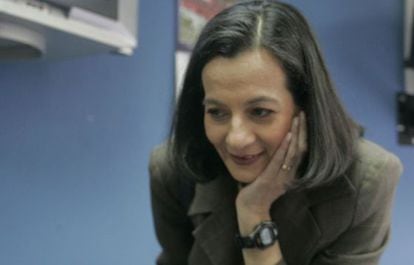Betancourt’s former number two leaves Colombia’s Peace Commission
Move by congresswoman and ex-FARC hostage Clara Rojas follows questions over her victim status

Colombian deputy and former Revolutionary Armed Forces of Colombia (FARC) hostage Clara Rojas has left the Congress Peace Commission, saying that it did not offer her adequate channels to defend her status as a victim. Her decision came after a rebel soldier wrote a post on the guerrilla group’s official blog denying Rojas’ right to call herself a victim and questioning her account of her six-year captivity during which she became pregnant and gave birth to a son, Emmanuel, in difficult conditions.
The post recounts Rojas’ kidnapping in 2002 alongside former presidential candidate Íngrid Betancourt, alleging that she chose to join Betancourt in captivity. “She insisted so much that she ended up staying,” the writer says. The rebel’s account has been roundly repudiated by the public.
According to the guerrilla writer, both women enjoyed certain freedoms “because of their gender and social class.” She even talks about Roja’s pregnancy, explaining why they had to separate her from her son. Emmanuel was given to some peasants because of “the nature of the conflict,” she writes.
No one on the FARC’s negotiating team has expressed any opposition to acknowledging or meeting with the victims of the conflict
Rojas wrote a letter to the president of Congress saying that she had decided to resign because the circumstances described in that note “have personal implications that affect my family and my personal life.” Over the last few days, the government’s chief peace negotiator Humberto de la Calle has questioned the validity of the note and described the accusations as “denigrating” and “inexplicable” given that the administration is currently in talks with the FARC to reach an agreement on reparations for more than six million victims. “This is a show of disrespect toward a victim whom the FARC held in captivity for a number of years,” De la Calle said.
FARC leaders quickly addressed the controversy. The group’s spokesman in Cuba, Jesús Santrich, said the rebel writer’s declarations were personal opinions that did not necessarily reflect the position of the negotiating team. “It is a personal interpretation,” he said. “No one on FARC’s negotiating team has expressed any opposition to acknowledging or meeting with the victims of the conflict.”
Yet no one understands what was published on the blog, either. “That it was published on the FARC’s official site means it had the approval of the leaders, that there is collective insensitivity or at least widespread insensitivity,” journalist Marta Ruiz wrote in her column in Semana magazine.
This incident comes just as the government and the rebel group are making progress in negotiations on one of the most critical points on the agenda – victims’ rights. The blog post contradicts the apology FARC chief negotiator Iván Márquez gave to the victims who traveled to Cuba a few weeks before to meet face to face with their aggressors.
Meanwhile, Rojas told local media outlets that the writer’s declarations had surprised her because she “had moved on from the kidnapping.” She told El Tiempo newspaper that the incident showed a lack of communication within the organization and besmirched “the integrity of a woman and her family,” who had suffered a dramatic kidnapping, one of the crimes most reviled in Colombia.
In the midst of that controversy, 12 victims will travel to Cuba on Wednesday to meet with negotiators about reparations. This is the second victims’ group to make the trip. Another delegation participated in the peace talks two weeks ago. The government plans to bring three more groups to the negotiation table.
Translation: Dyane Jean François










































